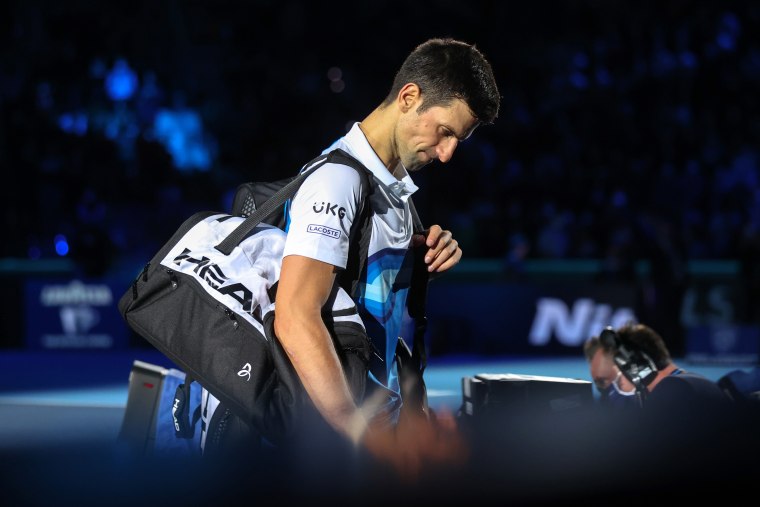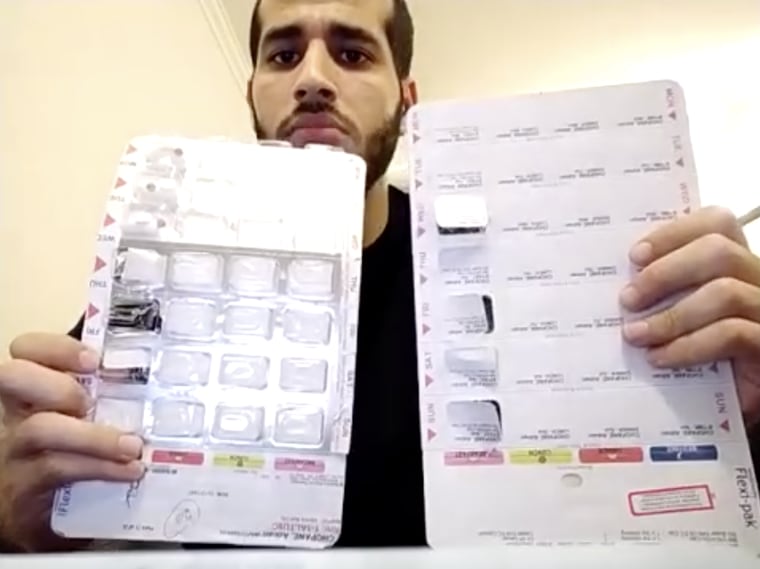
This article is more than
4 year oldHe’s spent the past two months detained in the rundown Park Hotel in Melbourne, Australia, and now Adnan Choopani has a famous new neighbor — tennis star Novak Djokovic.
“I couldn’t believe that Djokovic is here,” Choopani, 24, said in a Friday video call from his room in the makeshift immigration detention center, which is home to 36 asylum-seekers.
“I hope he shares what he’s seen,” he said, adding that the locked windows, the lack of fresh air and the poor food were taking a mental toll on him and other residents.
Djokovic, the 20-time grand slam winner, moved into a room on the floor below Choopani last week after Australian border officials canceled his visa for failing to provide appropriate evidence to meet entry requirements.
The country’s Covid-19 rules stipulate that incoming travelers must have had two shots of an approved vaccine or must have exemptions with genuine medical reasons to avoid quarantine.

Ahead of a court hearing Monday, Djokovic’s lawyers argued in papers filed with the Federal Circuit and Family Court of Australia that he had been granted an exemption because he contracted — and recovered from — the coronavirus last month.
As he waits for his case to be heard, Djokovic has been confined to the Park Hotel, a gray, five-story immigration detention center in an inner-city suburb of Melbourne — a little more than 2 miles from the luxurious city hotels where most of the other players competing in the Australian Open tennis tournament are staying.
His mother, Dijana, was less than impressed, telling reporters at her family’s restaurant in Belgrade, Serbia, last week that it was “dirty” and infested with bugs. She also criticized the food.
Choopani echoed the sentiment, calling the food “disgusting.” He said that on a number of occasions he had found maggots in some of the food and was given moldy bread to eat.
Another detainee, Mohammed Joy Miah, posted images of the insects in the food on social media late last month.
Pls pay attention.
— Joy (@mohammedJoy73) December 27, 2021
Urgent-see this food with Maggots
It was delivered at 5.30pm tonight as evening meal at Park prison for 34 men.
Even guards agreed not edible-took it away.
Now men have no dinner.
Detained for 2yrs,now in rooms on level2, now maggots in food!#GameOver pic.twitter.com/ar5jFv7zlI
Choopani said conditions in the hotel, which is also being used to quarantine travelers who have tested positive for Covid-19, had “mentally destroyed” some of the residents.
“All people do is just stay in their room,” he said.
Facing oppression as a member of the Ahwazi Arab minority in Iran, Choopani said, his family had urged him to flee. At just 15 years old, he made his way to Indonesia, where he boarded a boat for Australia.
Authorities intercepted the vessel, and Choopani has been detained ever since then. Australia has a mandatory detention policy for anyone arriving without a visa and to deter people’s arriving by boat.
Choopani said he spent most of the time in offshore processing centers on Christmas Island and the island of Nauru in the South Pacific.
He added he had lived in a number of detention centers after he moved to the mainland in 2019, before he ended up in the Park Hotel in November.
“Nine years of my life are gone for nothing,” he said, adding that he was “heartbroken” to admit that his teens and his early 20s had been wasted and that he had missed out on things like a graduation party and having a girlfriend.
He said detention also prevented him from starting a family or getting a job. He had never been convicted of a crime, he said; he “just simply asked for asylum.”
Choopani said he suffers from post-traumatic stress disorder. He showed NBC News two large medication packs filled with antidepressants and sleeping tablets.
“I sleep all day, and when I wake up, I watch a bit of a movie and that’s it — I’ll take my medication again and sleep,” he said.

Choopani doesn’t know when he’ll be released, but when it comes to his own potential freedom he said he dreamed of walking down the street on his own without being guarded.
NBC News has asked the Australian Border Force, which uses the hotel to house asylum-seekers, for comment. In a statement to The New York Times, it said detainees in immigration hotels have “access to dedicated indoor and outdoor exercise and activity areas,” appropriate food, “clean, comfortable sleeping quarters” and other amenities.
Australia’s Department of Immigration and Border Protection also declined to comment on Choopani’s case.
While it is unclear what conditions Djokovic is being held in, his case has shined a spotlight on Australia’s immigration system.
“Australia’s treatment of asylum seekers is inhumane, deeply cruel & illegal under international law,” Sophie McNeill, the Australia researcher for Human Rights Watch, tweeted Friday.
The activist group Refugee Action Collective Victoria said in a statement Thursday, “Djokovic might spend a few days in detention but the refugees have been held for 8 years with no end in sight, for no good reason, other than the cruel politics of borders.”
Choopani said he hoped Djokovic would highlight the hotel’s conditions.
“I wish Mr. Djokovic can be our voice and talk about us,” he said.